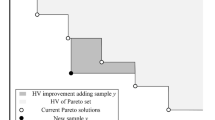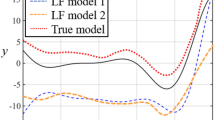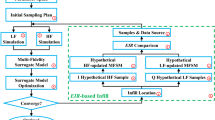Abstract
Sampling efficiency is important for simulation-based design optimization. While Bayesian optimization (BO) has been successfully applied in engineering problems, the cost associated with large-scale simulations has not been fully addressed. Extending the standard BO approaches to multi-fidelity optimization can utilize the information of low-fidelity models to further reduce the optimization cost. In this work, a multi-fidelity Bayesian optimization approach is proposed, in which hierarchical Kriging is used for constructing the multi-fidelity metamodel. The proposed approach quantifies the effect of HF and LF samples in multi-fidelity optimization based on a new concept of expected further improvement. A novel acquisition function is proposed to determine both the location and fidelity level of the next sample simultaneously, with the consideration of balance between the value of information provided by the new sample and the associated sampling cost. The proposed approach is compared with some state-of-the-art methods for multi-fidelity global optimization with numerical examples and an engineering case. The results show that the proposed approach can obtain global optimal solutions with reduced computational costs.





Similar content being viewed by others
References
Bakr MH, Bandler JW, Madsen K, Søndergaard J (2001) An introduction to the space mapping technique. Optim Eng 2:369–384
Bandler JW, Biernacki RM, Chen SH, Grobelny PA, Hemmers RH (1994) Space mapping technique for electromagnetic optimization. IEEE Trans Microw Theory Tech 42:2536–2544
Cai X, Qiu H, Gao L, Yang P, Shao X (2016) An enhanced RBF-HDMR integrated with an adaptive sampling method for approximating high dimensional problems in engineering design. Struct Multidiscip Optim 53:1209–1229
Chang KJ, Haftka RT, Giles GL, Kao I-J (1993) Sensitivity-based scaling for approximating structural response. J Aircr 30:283–288
Coello CAC (2000) Use of a self-adaptive penalty approach for engineering optimization problems. Comput Ind 41:113–127
Courrier N, Boucard P-A, Soulier B (2016) Variable-fidelity modeling of structural analysis of assemblies. J Glob Optim 64:577–613
Gano SE, Renaud JE, Sanders B (2005) Hybrid variable fidelity optimization by using a kriging-based scaling function. AIAA J 43:2422–2433
Gardner JR, Kusner MJ, Xu ZE, Weinberger KQ, Cunningham JP (2014) Bayesian optimization with inequality constraints. In: ICML. pp. 937–945
Gelbart MA, Snoek J, Adams RP (2014) Bayesian optimization with unknown constraints. arXiv preprint arXiv:1403.5607
Ghoreishi SF, Allaire D (2019) Multi-information source constrained Bayesian optimization. Struct Multidiscip Optim 59:977–991
Ghoreishi SF, Molkeri A, Srivastava A, Arroyave R, Allaire D (2018) Multi-information source fusion and optimization to realize ICME: application to dual-phase materials. J Mech Des 140:111409
Ghoreishi SF, Molkeri A, Arróyave R, Allaire D, Srivastava A (2019) Efficient use of multiple information sources in material design. Acta Mater 180:260–271
Han Z-H, Görtz S (2012) Hierarchical kriging model for variable-fidelity surrogate modeling. AIAA J 50:1885–1896
Huang D, Allen TT, Notz WI, Miller RA (2006) Sequential kriging optimization using multiple-fidelity evaluations. Struct Multidiscip Optim 32:369–382
Jones DR (2001) A taxonomy of global optimization methods based on response surfaces. J Glob Optim 21:345–383
Jones DR, Schonlau M, Welch WJ (1998) Efficient global optimization of expensive black-box functions. J Glob Optim 13:455–492
Kennedy MC, O'Hagan A (2000) Predicting the output from a complex computer code when fast approximations are available. Biometrika 87:1–13
Kim Y, Lee S, Yee K, Rhee D-H (2017) High-to-low initial sample ratio of hierarchical kriging for film hole array optimization. J Propuls Power 34:108–115
Koziel S, Bandler JW, Madsen K (2006) A space-mapping framework for engineering optimization—theory and implementation IEEE transactions on microwave. Theory Tech 54:3721–3730
Liu Y, Chen S, Wang F, Xiong F (2018) Sequential optimization using multi-level co-Kriging and extended expected improvement criterion. Struct Multidiscip Optim 58:1155–1173
McIntire M, Ratner D, Ermon S. (2016). Sparse Gaussian processes for Bayesian optimization. Proceedings of the Thirty-Second Conference on Uncertainty in Artificial Intelligence, pp. 517-526
Palar PS, Shimoyama K (2017) Multi-fidelity uncertainty analysis in CFD using hierarchical kriging. In: 35th AIAA Applied Aerodynamics Conference, p. 3261
Park J-S (1994) Optimal Latin-hypercube designs for computer experiments. J Stat Plan Inference 39:95–111
Queipo NV, Haftka RT, Shyy W, Goel T, Vaidyanathan R, Tucker PK (2005) Surrogate-based analysis and optimization. Prog Aerosp Sci 41:1–28
Schonlau M, Welch WJ, Jones DR (1998) Global versus local search in constrained optimization of computer models. Lecture Notes-Monograph Series 11-25
Shu L, Jiang P, Wan L, Zhou Q, Shao X, Zhang Y (2017) Metamodel-based design optimization employing a novel sequential sampling strategy. Eng Comput 34:2547–2564
Shu L, Jiang P, Song X, Zhou Q (2019a) Novel approach for selecting low-fidelity scale factor in multifidelity metamodeling. AIAA J 57:5320–5330
Shu L, Jiang P, Zhou Q, Xie T (2019b) An online variable-fidelity optimization approach for multi-objective design optimization. Struct Multidiscip Optim 60:1059–1077
Song C, Song W, Yang X (2017) Gradient-enhanced hierarchical kriging model for aerodynamic design optimization. J Aerosp Eng 30:04017072
Tran A, Sun J, Furlan JM, Pagalthivarthi KV, Visintainer RJ, Wang Y (2019a) pBO-2GP-3B: a batch parallel known/unknown constrained Bayesian optimization with feasibility classification and its applications in computational fluid dynamics. Comput Methods Appl Mech Eng 347:827–852
Tran A, Tran M, Wang Y (2019b) Constrained mixed-integer Gaussian mixture Bayesian optimization and its applications in designing fractal and auxetic metamaterials. Struct Multidiscip Optim 59:2131–2154
Tran A, Wildey T, McCann S (2020) sMF-BO-2CoGP: a sequential multi-fidelity constrained Bayesian optimization framework for design applications. J Comput Inf Sci Eng 20:031007
Ulaganathan S, Couckuyt I, Ferranti F, Laermans E, Dhaene T (2015) Performance study of multi-fidelity gradient enhanced kriging. Struct Multidiscip Optim 51:1017–1033
Wang GG (2003) Adaptive response surface method using inherited Latin hypercube design points. J Mech Des 125:210–220
Wang GG, Shan S (2007) Review of metamodeling techniques in support of engineering design optimization. J Mech Des 129:370–380
Xiong Y, Chen W, Tsui K-L (2008) A new variable-fidelity optimization framework based on model fusion and objective-oriented sequential sampling. J Mech Des 130:111401
Zhang Y, Han Z-H, Liu J, Song W-P (2015) Efficient variable-fidelity optimization applied to benchmark transonic airfoil design. In: 7th Asia-Pac int Symp Aerosp Technol, Cairns, Australia, pp. 25–27
Zhang Y, Han Z-H, Zhang K-S (2018) Variable-fidelity expected improvement method for efficient global optimization of expensive functions. Struct Multidiscip Optim 58:1431–1451
Zhang J, Yao X, Liu M, Wang Y. (2019) A Bayesian discrete optimization algorithm for permutation problems. Proceedings of 2019 IEEE Symposium Series on Computational Intelligence (SSCI 2019), pp.871-881
Zhou Q, Shao X, Jiang P, Zhou H, Shu L (2015) An adaptive global variable fidelity metamodeling strategy using a support vector regression based scaling function. Simul Model Pract Theory 59:18–35
Zhou Q, Shao X, Jiang P, Gao Z, Wang C, Shu L (2016) An active learning metamodeling approach by sequentially exploiting difference information from variable-fidelity models. Adv Eng Inform 30:283–297
Zhou Q, Wang Y, Choi S-K, Jiang P, Shao X, Hu J (2017) A sequential multi-fidelity metamodeling approach for data regression. Knowl-Based Syst 134:199–212
Acknowledgements
This research was supported by the National Natural Science Foundation of China (Grant No. 51775203, 51805179, and 51721092). The support of the China Scholarship Council is also appreciated.
Author information
Authors and Affiliations
Corresponding author
Ethics declarations
Conflict of interest
The authors declare that they have no conflict of interest.
Replication of results
Data or implementation code are available upon request.
Additional information
Responsible Editor: Nestor V Queipo
Publisher's note
Springer Nature remains neutral with regard to jurisdictional claims in published maps and institutional affiliations.
Rights and permissions
About this article
Cite this article
Shu, L., Jiang, P. & Wang, Y. A multi-fidelity Bayesian optimization approach based on the expected further improvement. Struct Multidisc Optim 63, 1709–1719 (2021). https://doi.org/10.1007/s00158-020-02772-4
Received:
Revised:
Accepted:
Published:
Issue Date:
DOI: https://doi.org/10.1007/s00158-020-02772-4




